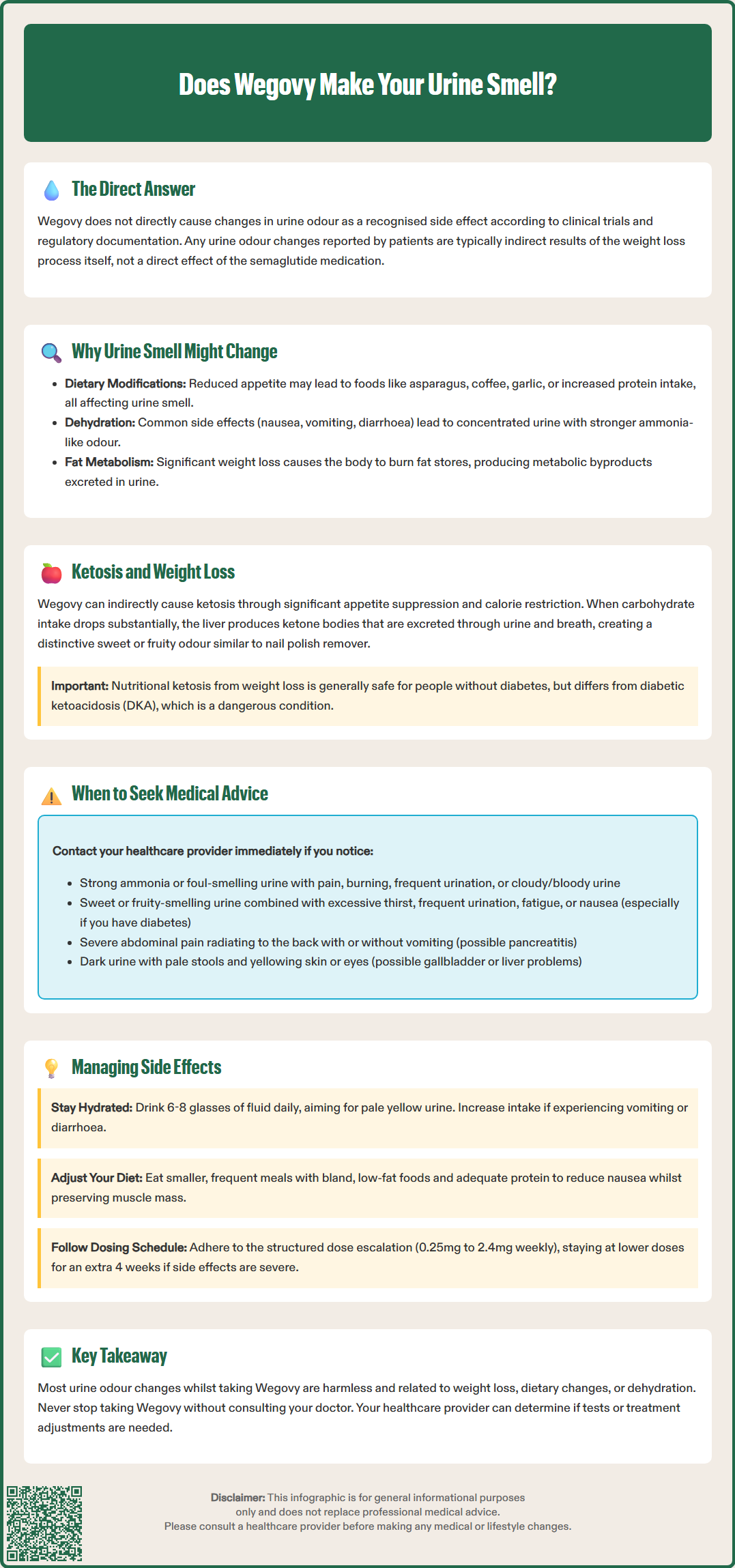
Does Wegovy make your urine smell? Wegovy (semaglutide) is not directly known to cause changes in urine odour as a recognised side effect in clinical trials or MHRA-approved product literature. However, some patients taking this GLP-1 receptor agonist have reported noticing urinary odour changes during treatment. These alterations are typically indirect consequences of the weight loss process—including dietary modifications, dehydration from gastrointestinal side effects, and metabolic changes such as ketosis—rather than a direct pharmacological effect of semaglutide itself. Understanding these mechanisms helps distinguish between expected physiological changes and symptoms requiring clinical assessment. Any new or unusual symptoms during Wegovy treatment should be discussed with your healthcare provider.
Quick Answer: Wegovy does not directly cause urine odour changes, but indirect effects such as dehydration, dietary modifications, and ketosis during weight loss may alter urinary smell.

Mounjaro® is the most innovative GLP-1 medication proven to dramatically curb appetite, hunger, and cravings to help professional men achieve substantial weight loss.
Start Here
Wegovy® is a weekly injectable GLP-1 medication with proven effectiveness in reducing appetite, hunger, and cravings to help busy professionals lose significant weight.
Start HereWegovy (semaglutide) is not directly known to cause changes in urine odour as a recognised side effect in clinical trials or product literature approved by the Medicines and Healthcare products Regulatory Agency (MHRA). According to the MHRA/EMC Summary of Product Characteristics (SmPC), the medication works as a glucagon-like peptide-1 (GLP-1) receptor agonist, primarily affecting appetite regulation and glucose metabolism rather than directly altering urinary composition or smell.
However, some patients taking Wegovy have reported noticing changes in their urine odour during treatment. These changes are typically indirect consequences of the weight loss process rather than a direct pharmacological effect of semaglutide itself. Understanding this distinction is important for patients who may be concerned about such changes.
It is worth noting that any new or unusual symptoms during medication use should be discussed with your healthcare provider. Whilst changes in urine smell are not listed amongst the common adverse effects of Wegovy—which include nausea, diarrhoea, vomiting, constipation, and abdominal pain—individual experiences can vary. Wegovy is also associated with gallbladder disease and, rarely, pancreatitis, which may require prompt assessment if abdominal pain occurs. Your GP or prescribing clinician can help determine whether any urinary changes are related to the medication, the weight loss process, dietary modifications, or an unrelated condition requiring investigation.
This article explores the potential reasons why urine odour might change during Wegovy treatment, the role of ketosis in weight loss, and when such changes warrant medical attention. Understanding these mechanisms can help patients distinguish between expected physiological changes and symptoms that require clinical assessment.
If you suspect an adverse reaction to Wegovy, you can report it through the MHRA Yellow Card scheme.

Several indirect mechanisms may explain why some individuals notice changes in urine odour whilst taking Wegovy, most of which relate to the metabolic and dietary changes accompanying significant weight loss rather than the medication itself.
Dietary modifications represent one of the most common causes. Wegovy reduces appetite substantially, often leading patients to alter their food intake patterns. Certain foods—particularly asparagus, coffee, garlic, and foods high in B vitamins—can impart distinctive odours to urine. Additionally, patients may increase protein intake whilst reducing carbohydrates as part of their weight management strategy, which can affect urinary odour through increased nitrogen metabolism and urea production.
Dehydration is another significant factor. According to the MHRA/EMC SmPC, Wegovy commonly causes gastrointestinal side effects including nausea, vomiting, and diarrhoea, particularly during dose escalation. These effects can lead to reduced fluid intake or increased fluid loss, resulting in more concentrated urine with a stronger, more noticeable smell. Concentrated urine appears darker and has a more pungent ammonia-like odour due to higher concentrations of waste products.
Metabolic changes associated with weight loss can also contribute. As the body mobilises fat stores for energy—a primary goal of Wegovy treatment—various metabolic byproducts are produced and excreted through urine. The rate and extent of weight loss achieved with Wegovy (around 15% mean weight loss in clinical trials, as noted in NICE TA875) means these metabolic shifts can be quite pronounced.
Whilst dietary changes and metabolic shifts during weight loss may affect urinary characteristics, there is no established link between Wegovy and urinary tract infections. Nevertheless, any persistent changes in urine characteristics should prompt consideration of urinary tract pathology.
Ketosis is a metabolic state that can develop during significant calorie restriction or carbohydrate limitation, both of which may occur during Wegovy treatment. Understanding this process helps explain one potential mechanism for altered urine odour in some patients.
When carbohydrate intake is substantially reduced or when the body is in a significant caloric deficit, the liver begins breaking down fatty acids into ketone bodies (acetoacetate, beta-hydroxybutyrate, and acetone) to provide an alternative fuel source for the brain and other tissues. These ketones are partially excreted through urine and breath, often producing a distinctive sweet or fruity odour that some describe as similar to nail polish remover.
Whilst Wegovy does not directly induce ketosis through its pharmacological mechanism—unlike sodium-glucose co-transporter-2 (SGLT2) inhibitors used in diabetes management—the substantial appetite suppression and resulting calorie deficit can lead to mild nutritional ketosis in some individuals. This is particularly likely in patients who significantly reduce carbohydrate intake alongside using Wegovy, or those experiencing pronounced gastrointestinal side effects that limit food consumption.
It is important to distinguish nutritional ketosis from diabetic ketoacidosis (DKA), a dangerous condition primarily affecting people with type 1 diabetes. Nutritional ketosis during weight loss is generally mild and not harmful in individuals without diabetes. However, patients with type 2 diabetes taking Wegovy should be aware that significant changes in eating patterns and weight loss can affect blood glucose control and medication requirements. Those taking insulin or sulfonylureas may need dose adjustments to avoid hypoglycaemia, as advised in NICE guideline NG28.
If you notice a sweet or fruity smell to your urine alongside symptoms such as excessive thirst, frequent urination, fatigue, or confusion—particularly if you have diabetes—contact your healthcare provider promptly as these could indicate inadequate diabetes control requiring medication adjustment. People with diabetes who feel unwell should check their blood glucose and consider ketone testing. If DKA is suspected, seek urgent medical advice via NHS 111 or emergency services.
Whilst mild changes in urine odour during Wegovy treatment are often benign and related to dietary or metabolic shifts, certain symptoms warrant prompt medical assessment to rule out complications or unrelated conditions.
Seek medical advice if you experience:
Strong, persistent ammonia or foul-smelling urine accompanied by pain or burning during urination, increased urinary frequency, urgency, lower abdominal discomfort, or cloudy/bloody urine—these may indicate a urinary tract infection requiring antibiotic treatment
Sweet or fruity-smelling urine alongside excessive thirst, frequent urination, unexplained fatigue, nausea, vomiting, or abdominal pain—particularly if you have diabetes, as these could suggest inadequate glycaemic control
Severe, persistent abdominal pain that may radiate to the back, with or without vomiting—these could be signs of pancreatitis, a rare but serious adverse effect of GLP-1 receptor agonists requiring immediate medical attention
Dark urine with pale stools and yellowing of the skin or eyes (jaundice), which could indicate gallbladder or biliary disease—Wegovy is associated with an increased risk of gallstones and cholecystitis according to the MHRA/EMC SmPC
Persistent dehydration symptoms including dizziness, reduced urine output, dry mouth, or concentrated dark urine despite adequate fluid intake, especially if accompanied by ongoing vomiting or diarrhoea
Your GP may recommend investigations such as urinalysis, urine culture, blood tests to assess kidney function (urea, creatinine, electrolytes), liver function tests, or glucose monitoring depending on your symptoms and medical history. According to NICE Technology Appraisal 875, patients taking Wegovy should be monitored by specialist weight management services with regular assessment of treatment response and adverse effects.
Do not discontinue Wegovy without consulting your prescriber, as abrupt cessation may affect your weight management progress. Your healthcare provider can help determine whether any adjustments to your treatment plan, hydration strategy, or dietary approach are needed, or whether the urine changes represent a benign consequence of successful weight loss.
Effective management of Wegovy's side effects can minimise indirect consequences such as dehydration-related urine changes whilst optimising treatment outcomes and tolerability.
Hydration strategies are fundamental. The NHS generally recommends 6-8 glasses of fluid daily, aiming for pale yellow urine as a sign of good hydration. You may need to increase fluid intake if you experience vomiting or diarrhoea. Sipping fluids throughout the day rather than consuming large volumes at once may be better tolerated if you experience nausea. Clear fluids, diluted fruit juice, or oral rehydration solutions can help maintain electrolyte balance during gastrointestinal upset. Note that if you have heart failure or kidney disease, you should follow your healthcare provider's specific advice about fluid intake.
Dietary modifications can reduce both gastrointestinal side effects and associated urinary changes. Eat smaller, more frequent meals rather than large portions. Choose bland, low-fat foods during periods of nausea. Follow a balanced diet with adequate protein to preserve muscle mass during weight loss. If you have kidney disease, discuss appropriate protein intake with your healthcare provider or dietitian. Include sufficient fibre to support overall health and help manage constipation, which can occur with Wegovy.
Dose escalation management is crucial, as side effects are typically most pronounced when increasing doses. According to the MHRA/EMC SmPC, Wegovy follows a structured dose escalation schedule (0.25mg, 0.5mg, 1mg, 1.7mg, to maintenance 2.4mg weekly) specifically designed to improve tolerability. If side effects are severe, your prescriber may recommend remaining at a lower dose for an additional 4 weeks before escalating, as permitted within the product licence.
Timing of administration can influence tolerability. Wegovy should be injected once weekly on the same day. If needed, the weekly injection day can be changed as long as the time between two doses is at least 3 days. Whilst Wegovy can be taken at any time of day with or without food, some patients find that administering the injection in the evening reduces daytime nausea.
Regular monitoring and communication with your healthcare team ensures optimal outcomes. Report persistent or concerning symptoms promptly, attend scheduled follow-up appointments, and maintain realistic expectations about the weight loss timeline and potential side effects. Under NICE TA875, Wegovy is prescribed through specialist weight management services in the UK for a time-limited period, with continuation criteria applied according to local NHS guidelines.
Wegovy (semaglutide) is not directly known to cause urine odour changes as a recognised side effect. Any urinary smell alterations are typically indirect consequences of weight loss, dietary changes, dehydration from gastrointestinal side effects, or metabolic shifts such as ketosis.
A sweet or fruity urine odour may indicate ketosis, a metabolic state where the body breaks down fat for energy and excretes ketones through urine. This can occur during significant calorie restriction or carbohydrate limitation whilst taking Wegovy, particularly in patients with diabetes who should seek medical advice if this occurs alongside thirst, fatigue, or confusion.
Seek medical advice if you experience strong, foul-smelling urine with pain or burning during urination, sweet-smelling urine with excessive thirst or fatigue (especially if diabetic), severe abdominal pain, dark urine with jaundice, or persistent dehydration symptoms despite adequate fluid intake.
All medical content on this blog is created based on reputable, evidence-based sources and reviewed regularly for accuracy and relevance. While we strive to keep content up to date with the latest research and clinical guidelines, it is intended for general informational purposes only.
DisclaimerThis content is not a substitute for professional medical advice, diagnosis, or treatment. Always consult a qualified healthcare professional with any medical questions or concerns. Use of the information is at your own risk, and we are not responsible for any consequences resulting from its use.